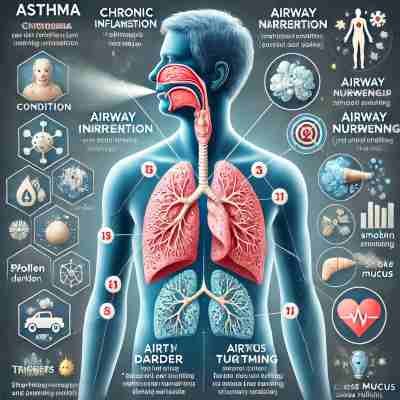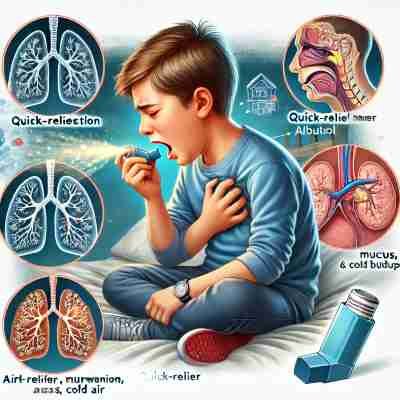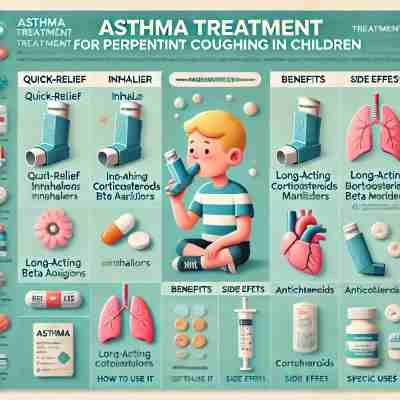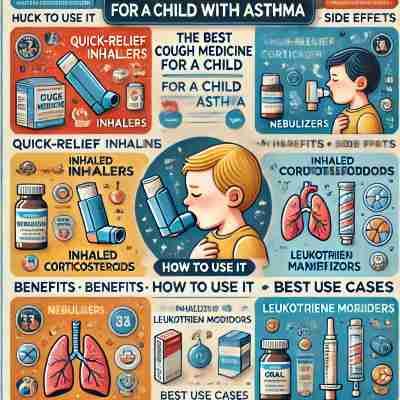Asthma-related coughing in children can be persistent and distressing, often worsening at night or with triggers like dust, cold air, or exercise. Unlike regular coughs, an asthma cough is usually dry and caused by inflamed airways.
Proper treatment is essential to prevent it from escalating into a severe asthma attack. Quick-relief inhalers like albuterol help open the airways instantly, while long-term control medications, such as inhaled corticosteroids, reduce inflammation over time. Along with medication, avoiding triggers, maintaining good air quality, and following a doctor-approved asthma action plan can help keep symptoms under control.
Recommended Reading: How To Get Rid of A Cough In 5 Minutes (Medicines+Home Remedies)
My Son Has Asthma And Can’t Stop Coughing (Causes+Treatment)

Table Of Contents
Recommended Reading: Over-The-Counter Asthma Tablets (Best Medicine For Asthma Cough)
What is Asthma?
Asthma
Asthma is a chronic lung condition that causes inflammation and narrowing of the airways, making it difficult to breathe. It often leads to symptoms like coughing, wheezing, and shortness of breath.

Asthma is a long-term lung disease that causes the airways to become inflamed and narrowed, making it difficult to breathe. This condition can affect anyone but is often diagnosed in childhood.
Key Points About Asthma
- Chronic Condition: Asthma is a lifelong condition that requires constant management.
- Airway Inflammation: The airways become swollen and irritated, making it harder for air to pass through.
- Airway Narrowing: The muscles around the airways tighten, making breathing even more difficult.
- Excess Mucus: Extra mucus is produced in the airways, adding to the blockage and making it harder to breathe.
Symptoms
- Wheezing: A whistling sound when breathing.
- Coughing: Especially at night or early morning.
- Shortness of Breath: Feeling like you can’t get enough air.
- Chest Tightness: Discomfort or pain in the chest area.
Triggers
- Allergens like pollen or pet dander.
- Irritants like smoke or pollution.
- Exercise and respiratory infections can also worsen asthma symptoms.
Management
- Quick-relief medications like inhalers open the airways during an attack.
- Long-term medications help reduce airway inflammation and prevent future asthma attacks.
Characteristics of Asthma
- Chronic Condition: Asthma is a lifelong disease that requires ongoing management.
- Airway Inflammation: The airways become swollen and sensitive, making it harder for air to flow in and out.
- Airway Narrowing: The muscles around the airways tighten, further restricting airflow.
- Excess Mucus Production: The airways produce more mucus than usual, leading to congestion and coughing.
Common Asthma Symptoms
- Wheezing (a whistling sound while breathing)
- Persistent coughing (especially at night)
- Shortness of breath
- Chest tightness or pain
Asthma Triggers
- Allergens: Pollen, dust mites, pet dander, mold, and cockroach allergens
- Respiratory Infections: Colds, flu, and other infections
- Irritants: Smoke, air pollution, strong odors, and chemicals
- Exercise: Physical activity, especially in cold or dry air
- Weather Changes: Cold air, humidity, and sudden weather shifts
- Emotional Stress: Strong emotions like crying, laughing, or stress
My Son Has Asthma and Can’t Stop Coughing
My Son Has Asthma
If your son has asthma and can’t stop coughing, it could be triggered by allergens, infections, or irritants. Identifying the cause is crucial for proper treatment and relief.

If your son has asthma and is experiencing constant coughing, it’s important to take quick action. Start by using his quick-relief inhaler as per his asthma action plan. If the coughing gets worse or he struggles to breathe, seek medical help immediately.
What to do?
- Asthma Coughing: Asthma causes coughing due to the inflammation and narrowing of the airways.
- Asthma Action Plan: Follow the plan your doctor has provided for managing asthma flare-ups. This will include steps for using medications and when to get help.
- Quick-Relief Inhaler: Use the quick-relief inhaler (like albuterol) at the first sign of coughing, wheezing, or shortness of breath.
- Seek Medical Attention: If the coughing is severe, frequent, or if your son is having difficulty breathing, call for medical help. Signs of a serious asthma attack include trouble speaking, rapid breathing, or pale/blue lips.
- Frequent Inhaler Use: If your son needs to use his inhaler more than usual, contact your doctor to adjust his treatment.
Other Considerations
- Triggers: Asthma coughing can be triggered by allergens, irritants, cold air, or nighttime conditions.
- Prevention: Identify and avoid known asthma triggers to reduce the chances of flare-ups.
- Medications: Your doctor may prescribe bronchodilators or corticosteroids to help control asthma and reduce coughing.
- Alternative Help: Some parents find relief by elevating their child’s head during sleep or treating GERD (acid reflux) if it worsens nighttime symptoms.
Asthma Treatment for Persistent Coughing in Children
Asthma Treatment
Asthma treatment for children with persistent coughing focuses on managing symptoms with inhalers and long-term medications. Proper care helps reduce flare-ups and improve breathing.

| Medication Type | How to Use | Benefits | Side Effects | Uses |
|---|---|---|---|---|
| Quick-Relief Inhalers | Use during an asthma attack or flare-up to open airways. Example: Albuterol Inhaler. | Provides rapid relief by expanding airways. | It can cause jitteriness, fast heartbeat, or tremors. | For immediate relief during asthma symptoms. |
| Inhaled Corticosteroids | Use daily to reduce airway inflammation. Example: Fluticasone. | Prevents long-term asthma symptoms and reduces inflammation. | It may cause throat irritation, hoarseness, or thrush (fungal infection). | Long-term control of asthma symptoms. |
| Leukotriene Modifiers | Taken orally once a day. Example: Singulair (Montelukast). | Helps prevent symptoms related to allergies and asthma. | It may cause mood changes, headaches, or stomach pain. | For controlling asthma related to allergies or environmental triggers. |
| Long-Acting Beta Agonists | Use with corticosteroids. Not for sudden attacks. Example: Salmeterol. | Maintains open airways for longer periods. | Possible heart palpitations, tremors. | For long-term control of chronic asthma. |
| Anticholinergics | It can be used if inhalers are not enough. Example: Ipratropium. | Helps relax the muscles around the airways. | It may cause dry mouth, cough, or headache. | Used in combination with other inhalers to manage symptoms. |
| Oral Corticosteroids | Short-term use in severe cases. Example: Prednisone. | Reduces inflammation during severe asthma flare-ups. | Weight gain, high blood sugar, or mood swings. | For treating severe asthma attacks or when inhalers aren’t enough. |
Best Cough Medicine for a Child with Asthma
Best Cough Medicine
The best cough medicine for a child with asthma often includes quick-relief inhalers like albuterol.

| Medication Type | How to Use | Benefits | Side Effects | Best For |
|---|---|---|---|---|
| Quick-Relief Inhalers | Use as directed during asthma symptoms. Example: Albuterol. | Opens airways quickly, relieves coughing fast. | Jitteriness, fast heartbeat, shaking. | Sudden coughing fits due to asthma. |
| Inhaled Corticosteroids | Use daily to control inflammation. Example: Fluticasone. | Prevents long-term asthma symptoms. | Hoarseness, throat irritation, thrush. | Chronic asthma cough prevention. |
| Nebulizers | Delivers medicine as a mist for easier inhalation. | Helps younger children or those struggling with inhalers. | Temporary jitteriness, mild throat irritation. | Children who cannot use inhalers properly. |
| Leukotriene Modifiers | Take orally once daily. Example: Montelukast (Singulair). | Helps prevent coughing linked to allergies. | Headache, stomach pain, and mood changes. | Asthma symptoms are triggered by allergens. |
| Oral Steroids | Short-term use for severe cases. Example: Prednisone. | Reduces inflammation in severe flare-ups. | Weight gain, mood swings, high blood sugar. | Severe asthma flare-ups cause uncontrollable coughing. |
Home Remedies for Cough Relief
- Honey (For children over 1 year) – 1-2 teaspoons can soothe a cough naturally.
- Steam Therapy – A warm shower or humidifier can loosen mucus and ease breathing.
- Cool Mist Humidifier – Keeps air moist, which helps with asthma-related coughs.
- Warm Liquids – Herbal tea, warm water, or broth can ease throat irritation.
- Hydration & Rest – Encourage plenty of fluids and adequate rest for recovery.
Best Cough Medicine for Asthmatics
Quick-Relief Inhalers (Rescue Medications)
| Medication | How to Use | Benefits | Side Effects | Uses |
|---|---|---|---|---|
| Albuterol (ProAir, Ventolin) | Inhale 1-2 puffs when coughing or during asthma attack. | Opens airways quickly for immediate relief. | Shaking, fast heartbeat, nervousness. | Sudden asthma symptoms, including cough. |
| Levalbuterol (Xopenex) | Similar to albuterol, used for quick relief during an attack. | Provides quick relief with fewer side effects. | Jitteriness, headache, dizziness. | Acute asthma symptoms and severe coughing. |
- How they work: These inhalers are short-acting beta-agonists (SABAs) that relax the muscles around the airways, helping you breathe easier.
Long-Term Control Medications
| Medication | How to Use | Benefits | Side Effects | Uses |
|---|---|---|---|---|
| Inhaled Corticosteroids | Use daily to reduce inflammation. Examples: Budesonide, Fluticasone. | Prevents asthma symptoms and reduces coughing over time. | Sore throat, hoarseness, oral thrush. | Chronic asthma management reduces coughing. |
| Leukotriene Modifiers | Take daily as prescribed. Example: Montelukast (Singulair). | Controls asthma triggered by allergies. | Headache, stomach pain, and mood changes. | Chronic asthma symptoms and allergic asthma. |
- How they work: These medications reduce inflammation and prevent asthma symptoms, including cough.
Other Medications
| Medication | How to Use | Benefits | Side Effects | Uses |
|---|---|---|---|---|
| Expectorants (e.g., Guaifenesin) | Take as directed to thin mucus. | Loosens mucus, making it easier to cough up. | Nausea, dizziness, and stomach upset. | Helpful for asthmatics with thick mucus. |
| Cough Suppressants (e.g., Dextromethorphan) | Use with caution under doctor’s advice. | Temporarily suppresses the urge to cough. | Drowsiness, dizziness, upset stomach. | It may help with night-time cough but consult a doctor first. |
My Son Has Asthma and Can’t Stop Coughing | Causes
- Allergens
- Pollen (from trees, grass, and flowers)
- Dust mites (found in bedding, carpets, and upholstery)
- Pet dander (from cats, dogs, and other furry animals)
- Mold spores (common in damp areas like bathrooms)
- Cockroach allergens (droppings and saliva can trigger asthma)
- Respiratory Infections
- Common colds and flu (increase airway inflammation)
- Bronchitis (infection of the bronchial tubes)
- Pneumonia (lung infection causing severe coughing)
- Irritants in the Air
- Cigarette smoke (both direct and secondhand smoke)
- Air pollution and smog (common in cities)
- Strong odors (perfumes, paints, cleaning products)
- Chemical fumes (from factories or household sprays)
- Exercise-Induced Asthma
- Coughing or wheezing after running or playing
- Shortness of breath during exercise
- Chest tightness that worsens with activity
- Weather Conditions
- Cold and dry air (can tighten airways)
- Hot and humid air (increases mucus buildup)
- Rapid temperature changes (can trigger coughing)
- Emotional Stress & Strong Emotions
- Laughing too hard
- Crying for long periods
- Stress and anxiety
- Certain Medications
- Beta-blockers (used for heart conditions and migraines)
- NSAIDs like aspirin and ibuprofen (can worsen asthma in some people)
- Acid Reflux (GERD)
- Stomach acid travels up the throat, irritating airways
- Nighttime coughing due to reflux when lying down
Symptoms of Asthma in Children
- Persistent Coughing
- Dry or wet cough that lasts for weeks.
- Worsens at night or during exercise.
- Triggered by cold air, laughing, or crying.
- Wheezing
- A whistling sound while breathing out.
- Commonly heard during asthma flare-ups.
- Shortness of Breath
- Difficulty breathing, especially during physical activities.
- Breathing becomes shallow or rapid.
- Chest Tightness
- Pressure or pain in the chest.
- It may feel like a squeezing sensation.
- Frequent Coughing at Night
- Coughing that disrupts sleep.
- Usually happens in the early morning hours.
- Fatigue
- Your child may feel tired easily due to difficulty breathing.
- May struggle to keep up with physical activities.
- Trouble Sleeping
- Restlessness and waking up due to difficulty breathing or coughing.
- Rapid Breathing
- An increased breathing rate even when resting.
- Signs of struggling to get air.
- Bluish Lips or Fingernails
- A sign of low oxygen levels during a severe asthma attack.
- This is an emergency and needs immediate medical attention.
- Anxiety or Panic
- Your child may become anxious or scared during an asthma attack.
- Difficulty breathing can cause panic.
FAQs
How do you stop a constant cough in a child with asthma?
To stop an asthma-related cough, use quick-relief inhalers like albuterol, as prescribed by the doctor. Keep your child away from triggers like dust, smoke, and cold air. If the cough continues, consult a doctor for a better treatment plan.
How do you stop an asthma cough?
Use a rescue inhaler to open the airways and reduce coughing. Long-term control medications like inhaled steroids may be needed to prevent future flare-ups. Avoid triggers such as allergens, strong odors, and cold air.
How can I calm my child’s asthma cough at night?
Ensure your child sleeps with an elevated head to prevent mucus buildup. Use a humidifier to keep the air moist and remove allergens from the bedroom.
Is it normal for kids with asthma to cough a lot?
Yes, children with asthma often have a chronic cough, especially at night or after exercise. If the cough worsens or lasts longer than usual
What causes asthma-related coughing in children?
Asthma-related coughing in children is often triggered by allergens, respiratory infections, irritants like smoke or pollution, and physical activity. Weather changes or stress can also make symptoms worse.
Can allergies cause coughing in asthmatic children?
Yes, allergens like pollen, dust mites, pet dander, and mold can cause airway inflammation, leading to coughing in children with asthma.
How does cold weather affect my child’s asthma cough?
Cold, dry air can irritate the airways, causing asthma symptoms like coughing. Keeping your child warm and using a scarf to cover their mouth while outside can help prevent cold air from worsening their symptoms.
Can stress worsen my child’s asthma and cause coughing?
Yes, stress and strong emotions can trigger or worsen asthma symptoms, including coughing. Helping your child manage stress through relaxation techniques and maintaining their asthma treatment plan can reduce these symptoms.
Why does my child with asthma keep coughing?
Asthma can cause persistent coughing due to airway inflammation and mucus buildup. Triggers like allergens, infections, or cold air can worsen symptoms.
What is the best cough medicine for a child with asthma?
Quick-relief inhalers like albuterol are the best option for asthma-related coughs. Avoid over-the-counter cough syrups unless recommended by a doctor.
Conclusion
Managing persistent coughing in a child with asthma requires attention and a proper treatment plan. Quick-relief inhalers like albuterol are vital for immediate relief, while long-term control medications, such as inhaled corticosteroids, help prevent symptoms from returning. Along with medication, it’s important to identify and avoid asthma triggers like dust, pollen, and smoke.
Ensure that you follow the asthma action plan created by your doctor and keep an eye on any worsening symptoms. Seek medical help if your child’s cough doesn’t improve or gets worse despite following the prescribed treatment.
If the current treatment isn’t working, consult with a doctor to explore other options. Proper care and management can make a big difference in controlling asthma and keeping your child healthy.
Disclaimer
The commissions we earn from partner links on this page do not influence our content. Our editorial content is based on thorough research and insights from qualified medical professionals to ensure the highest standards of accuracy and reliability.
The information provided on Doseway is for educational purposes only. Your health and wellness are unique to you, and the products and services we review may not be suitable for your individual circumstances. We do not offer personal medical advice, diagnosis, or treatment plans. For specific advice, please consult with a healthcare professional. Doseway adheres to strict editorial integrity standards. To the best of our knowledge, all content is accurate as of the date posted, though offers and information may change. The opinions expressed are the author’s own and have not been influenced, approved, or endorsed by our partners.

 Cart is empty
Cart is empty
Add a Comment